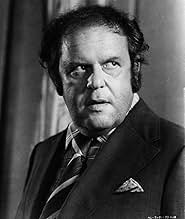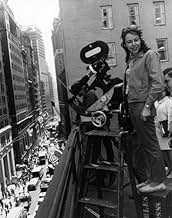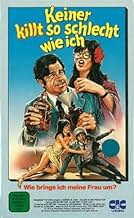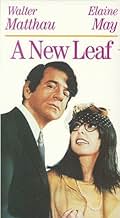AVALIAÇÃO DA IMDb
7,3/10
8,2 mil
SUA AVALIAÇÃO
Adicionar um enredo no seu idiomaWhen Henry Graham's lawyer informs him that his playboy lifestyle has consumed all of his funds, he must avoid sliding don the social ladder. He plans to marry wealthy scientist Henrietta Lo... Ler tudoWhen Henry Graham's lawyer informs him that his playboy lifestyle has consumed all of his funds, he must avoid sliding don the social ladder. He plans to marry wealthy scientist Henrietta Lowell--and kill her.When Henry Graham's lawyer informs him that his playboy lifestyle has consumed all of his funds, he must avoid sliding don the social ladder. He plans to marry wealthy scientist Henrietta Lowell--and kill her.
- Prêmios
- 1 vitória e 3 indicações no total
Conrad Bain
- Professor Heinrich
- (não creditado)
Ida Berlin
- Maid
- (não creditado)
Mildred Clinton
- Mrs. Heinrich
- (não creditado)
Trent Gough
- Victor the Butler
- (não creditado)
- Direção
- Roteiristas
- Elenco e equipe completos
- Produção, bilheteria e muito mais no IMDbPro
Avaliações em destaque
There is a category of films that includes several movies made by serious artists which emerged in a final form much different from that originally conceived. This group includes Erich Von Stroheim's silent masterpiece "Greed"------originally made as a movie that ran for over nine hours!; John Huston's filming of Stephen Crane's "Red Badge of Courage"-----finally presented to us by M-G-M in a badly mutilated 69 minute fragment of its original form; Orson Welles' conception of Booth Tarkington's "Magnificent Ambersons"---taken away from him by RKO bureaucrats who then edited it down to a truncated 88 minutes; and Frank Capra's "Lost Horizon"---originally released at 130 minutes in length and then chopped down to 109 minutes in subsequent re-releases.
We will never know what these works would have ended up looking like. Even in a recent attempt to "restore" "Greed" to something approximating its original form, the missing links are supplied through available studio "still" photos. Such travesties have been going on for years. Judy Garland's much admired version of "A Star Is Born" can now be seen only in a "restored" version that follows a fate somewhat similar to that of "Greed." The same is true of "Lost Horizon." Nonetheless, we should be grateful that a portion of these films did survive, to give us the pleasure of seeing something very special---even if only in a limited sense,
This takes us to "A New Leaf." As most film goers know, Elaine May wrote a significantly different (and much darker) screenplay than the movie we now see on the screen. But to her credit, the film she made had so many elements of true greatness in it that the studio edited version now available is very enjoyable on its own terms. It is one of the most underrated comedies of the 1970's and surely one of the funniest and most inspired.
The ensemble of actors May gathered created some superb comic characters---and have never done any better work in comedy. May and Walter Matthau's chemistry in the leading roles worked exceptionally well. William Redfield (who died much too young) is wonderful in a carefully understated role. And singled out for special recognition is George Rose as Matthau's long-suffering valet---a nuanced presentation by a very gifted actor.
Matthau's romance of May is sweet, touching, at times somewhat edgy and always engaging. The growth of their relationship from an almost bloodless union of convenience to the quite tender match up at the end is but one example of the high level of May's comedic writing and the very capable acting of May and Matthau. Too bad that they never had the opportunity to appear together again.
"A New Leaf" deserves both a wider audience, and repeated viewings to appreciate just what a great film it really is. As others have noted, it also demands a good DVD presentation for that whole new generation of lovers of fine comedy who have never seen it before.
Can anyone watch Renee Taylor in her one great scene with Matthau uttering the line "Don't let them out!" possibly ever forget this movie?
Finally---a personal appeal to Elaine May. Some day (soon we hope), "A New Leaf" will be released to DVD in an edition worthy of the film so many people have come to admire. You will no doubt be asked to supply the DVD with an audio commentary on the film. It is essential----really critical----that your views on the making of this film be preserved for present and future generations. Almost 40 years have passed since its original release. Tell us your story!
We will never know what these works would have ended up looking like. Even in a recent attempt to "restore" "Greed" to something approximating its original form, the missing links are supplied through available studio "still" photos. Such travesties have been going on for years. Judy Garland's much admired version of "A Star Is Born" can now be seen only in a "restored" version that follows a fate somewhat similar to that of "Greed." The same is true of "Lost Horizon." Nonetheless, we should be grateful that a portion of these films did survive, to give us the pleasure of seeing something very special---even if only in a limited sense,
This takes us to "A New Leaf." As most film goers know, Elaine May wrote a significantly different (and much darker) screenplay than the movie we now see on the screen. But to her credit, the film she made had so many elements of true greatness in it that the studio edited version now available is very enjoyable on its own terms. It is one of the most underrated comedies of the 1970's and surely one of the funniest and most inspired.
The ensemble of actors May gathered created some superb comic characters---and have never done any better work in comedy. May and Walter Matthau's chemistry in the leading roles worked exceptionally well. William Redfield (who died much too young) is wonderful in a carefully understated role. And singled out for special recognition is George Rose as Matthau's long-suffering valet---a nuanced presentation by a very gifted actor.
Matthau's romance of May is sweet, touching, at times somewhat edgy and always engaging. The growth of their relationship from an almost bloodless union of convenience to the quite tender match up at the end is but one example of the high level of May's comedic writing and the very capable acting of May and Matthau. Too bad that they never had the opportunity to appear together again.
"A New Leaf" deserves both a wider audience, and repeated viewings to appreciate just what a great film it really is. As others have noted, it also demands a good DVD presentation for that whole new generation of lovers of fine comedy who have never seen it before.
Can anyone watch Renee Taylor in her one great scene with Matthau uttering the line "Don't let them out!" possibly ever forget this movie?
Finally---a personal appeal to Elaine May. Some day (soon we hope), "A New Leaf" will be released to DVD in an edition worthy of the film so many people have come to admire. You will no doubt be asked to supply the DVD with an audio commentary on the film. It is essential----really critical----that your views on the making of this film be preserved for present and future generations. Almost 40 years have passed since its original release. Tell us your story!
Il not recount the story, as others have. The lack of response and proper public recognition for this film my be due to Elaine May's very dry wit and wry sense of humor, which, I think, simply sailed over the heads of many viewers. And it's truly most unfortunate, as this is a VERY funny film (for those who are perceptive and appreciate the subtler and darker shades of humor and life)! To the dude who rated it a "1": "A New Leaf" was nominated for 2 Golden Globes (Comedy -- Best Picture and Best Actress) and for the WGA's (the industry's official Writer's Guild -- i.e., her peers, other screenwriters) writing award for best comedy (from another medium) that year! No offense, but I value my own (and their) sensibilities a bit more than yours!! And it's impeccably acted, as others have mentioned, filled with flawless comedic timing and wry, wry wit. Simply wonderful.
Few people have ever even heard of "A New Leaf" and that is a shame. It is one of the funniest films in the last 30 years. Walter Matthau plays a spoiled rich man who discovers that his fortune is gone and he needs to marry in a short time to save what little he has left. His solution? Woo a rich woman, marry her, and kill her all in a week. So he picks the nerdy, klutzy, and not so attractive Elaine May (brilliant...she also wrote and directed) whose love is flowers. The film then follows Matthau as he attempts to carry out his plan. This film is full of BIG laughs and should be seen by anyone who loves a good comedy.
One of those films which has no real highlight but which never the less leaves you feeling that you have just really enjoyed the movie. Matthau plays his roll in a way that no other could, making you feel real contempt for his character until at the last fence, he redeems himself completely. Producing and acting in the major supporting role shows the bungling and accident prone Elaine May on top form also. A real forgotten gem that is certainly worth the view.
A New Leaf (1971)
A kookie, forcibly odd movie. If at first you think it's just plain stupid, keep watching. It's really well balanced, smartly written, and acted with more restraint than usual for a madcap movie like this.
It's billed (by some) as filled with dark humor, but it didn't strike me as dark, not like the contemporary "Harold and Maude" for example. But there is an unusual tone achieved here that is just slightly different and worth getting a feel for. There is, for another example, a parallel in general plot and scenario to "How to Murder Your Wife" from 1965, complete with the willing butler and the hapless rich bachelor, but that movie is a silly 1960s farce and this one has an edge of almost poignancy to it. (I write that word and think Elaine May would cringe--only because I don't think there is an intention to be sentimental or even romantic, the last scene notwithstanding.)
The star is singularly Walter Matthau, who is almost necessarily goofy just by appearances. But maybe the first clever trick by the director, Elaine May, is putting the goofy man in even goofier situations so that he comes off as actually someone serious and believable. To have his character, Henry Graham, driving in his red Ferrari wearing a crash helmet is pure insanity, yet you don't blink an eye. The guy is self-absorbed and nuts. But also very likable, a little out of touch the way we all are, or wish we could be (if we had his money).
And of course the man's dilemma is stated immediately: the money he once had so much of is used up. And you have to see to appreciate the one long scene in the first twenty minutes with Graham meeting his financial adviser about some bounced checks. This is comedy at its absolute best--I mean that. Watch only this scene if you must (and I dare you to skip the rest of the movie once you do). The actor opposite Matthau here is William Redfield, who pulls off the most brilliant of performances.
The other leading character, eventually, is Elaine May herself as the clumsy, naive, filthy rich scientist who Graham sets his sights on for salvation. She is terrific, as well, and like Woody Allen of the same time ("Bananas" is also 1971) seems to direct her own comic zaniness with a calculated distance. The rest of the shenanigans play out with the necessary twists, and it's consistently funny.
So, see this for its freshness even four decades later. No wonder it has a (small but growing) cult following. May has suffered historically from having made the bizarrely awkward "Ishtar" and for being forever linked in the early 1960s as the comedy partner of Mike Nichols, whose movie career overshadows almost everyone's. But here, at least, she shines on her own terms, without distraction.
A kookie, forcibly odd movie. If at first you think it's just plain stupid, keep watching. It's really well balanced, smartly written, and acted with more restraint than usual for a madcap movie like this.
It's billed (by some) as filled with dark humor, but it didn't strike me as dark, not like the contemporary "Harold and Maude" for example. But there is an unusual tone achieved here that is just slightly different and worth getting a feel for. There is, for another example, a parallel in general plot and scenario to "How to Murder Your Wife" from 1965, complete with the willing butler and the hapless rich bachelor, but that movie is a silly 1960s farce and this one has an edge of almost poignancy to it. (I write that word and think Elaine May would cringe--only because I don't think there is an intention to be sentimental or even romantic, the last scene notwithstanding.)
The star is singularly Walter Matthau, who is almost necessarily goofy just by appearances. But maybe the first clever trick by the director, Elaine May, is putting the goofy man in even goofier situations so that he comes off as actually someone serious and believable. To have his character, Henry Graham, driving in his red Ferrari wearing a crash helmet is pure insanity, yet you don't blink an eye. The guy is self-absorbed and nuts. But also very likable, a little out of touch the way we all are, or wish we could be (if we had his money).
And of course the man's dilemma is stated immediately: the money he once had so much of is used up. And you have to see to appreciate the one long scene in the first twenty minutes with Graham meeting his financial adviser about some bounced checks. This is comedy at its absolute best--I mean that. Watch only this scene if you must (and I dare you to skip the rest of the movie once you do). The actor opposite Matthau here is William Redfield, who pulls off the most brilliant of performances.
The other leading character, eventually, is Elaine May herself as the clumsy, naive, filthy rich scientist who Graham sets his sights on for salvation. She is terrific, as well, and like Woody Allen of the same time ("Bananas" is also 1971) seems to direct her own comic zaniness with a calculated distance. The rest of the shenanigans play out with the necessary twists, and it's consistently funny.
So, see this for its freshness even four decades later. No wonder it has a (small but growing) cult following. May has suffered historically from having made the bizarrely awkward "Ishtar" and for being forever linked in the early 1960s as the comedy partner of Mike Nichols, whose movie career overshadows almost everyone's. But here, at least, she shines on her own terms, without distraction.
Você sabia?
- CuriosidadesThe film as delivered by Elaine May was drastically re-cut and shortened ("butchered", according to some) by Paramount before its release. May sued Paramount after such drastic cuts and attempted to have her name removed from the credits, but was unsuccessful. Sadly, neither the director's cut of the film nor the original shooting script has ever been made publicly available.
- Citações
Henry Graham: Excuse me, you're not by any chance related to the Boston Hitlers?
- ConexõesFeatured in Siskel & Ebert & the Movies: Buried Treasures - 1987 Edition (1987)
Principais escolhas
Faça login para avaliar e ver a lista de recomendações personalizadas
Detalhes
- Data de lançamento
- País de origem
- Idiomas
- Também conhecido como
- A New Leaf
- Locações de filme
- Oakland Gardens, Queens, Nova Iorque, Nova Iorque, EUA(Henry drives his Ferrari from the southbound Cross Island Parkway to the eastbound Long Island Expressway)
- Empresas de produção
- Consulte mais créditos da empresa na IMDbPro
Bilheteria
- Orçamento
- US$ 4.000.000 (estimativa)
- Faturamento bruto mundial
- US$ 308
Contribua para esta página
Sugerir uma alteração ou adicionar conteúdo ausente

Principal brecha
By what name was O Caçador de Dotes (1971) officially released in India in English?
Responda

































